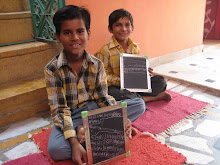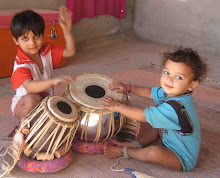Poverty is a dehumanizing state. It is not simply the lack of money, but the total absence of choice, opportunity and hope. The shadowy reality of poverty is that it assigns people negative value; individuals are defined exclusively by their deficits.
On the surface, the Merasi (musicians) live in expansive poverty. Yet valuing a community based on what they are not is a fundamentally disrespectful approach to change. Human substance does not reside in what we are not, but in what we are. And the Merasi are many, many things.
The Merasi are a community of musicians who narrate the folk culture of their Indian desert landscape in ancient song systems. They stir chai (tea), lay bricks, horns, inhale in rhythm. Music is the beginning, middle and end, and as the global hand of modernization sweeps across India, that music is on the cusp of extinction.
The Merasi School exists solely to support community-driven change. While the world calls the Merasi ‘Manganiyar,’ meaning beggar, the Merasi define themselves by their artistic prosperity rather than their social poverty.
Through daily academic and music classes, we supports the development of creative minds, hearts and hands capable of social transformation. There is no poverty at The Merasi School, only the loud, relentless rhythm of possibility.
Sunday, May 31, 2009
Sunday, May 10, 2009
Six Degrees of Connection
If my neighbor Sarah from rural Algeria can connect to Kevin Bacon in less than six degrees, than there's no reason why we cannot link the realization of two desires into one coherent mission. The Merasi community wants to both preserve their 37-generation old musical legacy and create a reality unobstructed by discrimination. When we put our heads together to shape a curriculum that met both objectives, we discovered that these artistic and social ambitions don't just go hand-in-hand, they are downright inseparable.
Rhythm is as fundamental to the Merasi as food and water. "We cry in rhythm," they say. Children are rocked to sleep in five-beat patterns and a lone dholak (drum) is never without a player for long. Art is life; yet life for the Merasi is the art of survival. Enter education, an academic map that navigates students from a futile, reactive fight against crippling marginalization to a proactive, empowered reformation of art and justice in the contemporary world. It's a bumpy road; we've a lot along the way. But every hand that reaches out in the darkness makes a powerful difference. Click here to find out what you can do.
Rhythm is as fundamental to the Merasi as food and water. "We cry in rhythm," they say. Children are rocked to sleep in five-beat patterns and a lone dholak (drum) is never without a player for long. Art is life; yet life for the Merasi is the art of survival. Enter education, an academic map that navigates students from a futile, reactive fight against crippling marginalization to a proactive, empowered reformation of art and justice in the contemporary world. It's a bumpy road; we've a lot along the way. But every hand that reaches out in the darkness makes a powerful difference. Click here to find out what you can do.
Subscribe to:
Comments (Atom)



